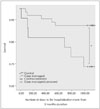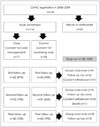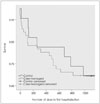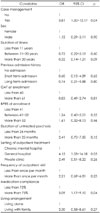Abstract
Objectives
This study was conducted to observe a longitudinal course of patients with schizophrenia enrolled in a community mental health center (CMHC) in Seoul, Korea, and to evaluate the clinical efficacy of case management provided for them.
Methods
Study subjects, including 50 patients in a case-managed group, and 34 patients in the control group, were enrolled from a CMHC and followed up for 36 months. Annual length of hospitalization was compared between two groups by t-tests and time until hospitalization by Kaplan-Meier survival analysis.
Results
For the first year of observation, there was no significant difference in annual length of hospitalization between two groups (3.4 weeks vs. 2.9 weeks), but annual length of hospitalization of the case-managed group became significantly shorter for the second (1.7 weeks vs. 7.2 weeks) and third year (1.4 weeks vs. 7.8 weeks). In Kaplan-Meier survival analysis, no difference in time until hospitalization was observed between two groups, but time until hospitalization more than 3 months was significantly shorter in the control group.
Figures and Tables
 | Fig. 2Comparison of mean Brief Psychiatric Rating Scale (BPRS) score between treatment groups during follow-up period. * : p<0.05 by independent t-tests. Significant difference of mean BPRS score between case-managed and control group were observed at baseline and at all three follow-up interviews. Additionally, there was no significant difference in the mean change of BPRS score (-6.0 vs. -2.5) between case-managed and control group during follow up period. |
 | Fig. 3Comparison of yearly hospitalized durations (weeks) between treatment groups during follow-up period. * : Significant difference by independent t-tests observed between case and control group at 24- and 36-month follow up points. |
 | Fig. 6Kaplan-Meier analysis of case and control groups for the first hospitalization event more than 3 months. * : p<0.01. Significant difference of survival between case managed and control groups observed by log-rank test. |
References
1. Thornicroft G, Szmukler G. Textbook of community psychiatry. Oxford: Oxford University Press;2001.
2. Ministry of health and welfare. Procedural guide to the mental health services for year 2014. Sejong: Ministry of health and welfare;2014.
3. Talbott JA. The chronic mentally ill: what do we know and why aren't we implementing what we know?. In : Menninger WW, Hannah G, editors. The chronic mental patient/II. Washington, DC: American Psychiatric Press;1987. p. 1–29.
4. Moore ST. A social work practice model of case management: the case management grid. Soc Work. 1990; 35:444–448.
5. Lamb HR. Therapist-case managers: more than brokers of services. Hosp Community Psychiatry. 1980; 31:762–764.

6. Stein LI, Test MA. Alternative to mental hospital treatment. I. Conceptual model, treatment program, and clinical evaluation. Arch Gen Psychiatry. 1980; 37:392–397.
7. Mueser KT, Bond GR, Drake RE, Resnick SG. Models of community care for severe mental illness: a review of research on case management. Schizophr Bull. 1998; 24:37–74.

8. Franklin JL, Solovitz B, Mason M, Clemons JR, Miller GE. An evaluation of case management. Am J Public Health. 1987; 77:674–678.

9. Ford R, Beadsmoore A, Ryan P, Repper J, Craig T, Muijen M. Providing the safety net: case management for people with a serious mental illness. J Ment Health. 1995; 4:91–97.

10. Macias C, Kinney R, Farley OW, Jackson R, Vos B. The role of case management within a community support system: partnership with psychosocial rehabilitation. Community Ment Health J. 1994; 30:323–339.

11. Marshall M, Lockwood A, Gath D. Social services case-management for long-term mental disorders: a randomised controlled trial. Lancet. 1995; 345:409–412.

12. Marks IM, Connolly J, Muijen M, Audini B, McNamee G, Lawrence RE. Home-based versus hospital-based care for people with serious mental illness. Br J Psychiatry. 1994; 165:179–194.

13. Solomon P, Draine J, Delaney MA. The working alliance and consumer case management. J Ment Health Adm. 1995; 22:126–134.

14. Marshall M, Gray A, Lockwood A, Green R. Case management for people with severe mental disorders. Cochrane Database Syst Rev. 2000; (2):CD000050.

15. Burns T, Catty J, Dash M, Roberts C, Lockwood A, Marshall M. Use of intensive case management to reduce time in hospital in people with severe mental illness: systematic review and meta-regression. BMJ. 2007; 335:336.

16. Marshall M, Lockwood A. Assertive community treatment for people with severe mental disorders. Cochrane Database Syst Rev. 2000; (2):CD001089.

17. Malone D, Marriott S, Newton-Howes G, Simmonds S, Tyrer P. Community mental health teams for people with severe mental illnesses and disordered personality. Schizophr Bull. 2009; 35:13–14.

18. Suh TW, Kim SJ, Kim YH, Shin YJ, Yoon MS. 2002 report of community mental health commision. Seoul: Korea Institute for Health and Social Affairs;2002.
19. Lee YM, Won KA, Kim MS, Suh TW. The effectiveness of psychosocial rehabilitation for chronic mentally ill patients of Suwon community mental health center. J Korean Assoc Soc Psychiatry. 2003; 8:101–109.
20. Lee KS, Kim YH. The effect of the community-based mental health program on the improvement of daily living skills for the chronic mentally Ill. J Korean Acad Psychiatr Ment Health Nurs. 1997; 6:141–152.
21. Suh JH. A study on the development and evaluation of vocational rehabilitation program for patients with schizophrenia [dissertation]. Seoul: Yonsei University;1998.
22. Noh IY. Comparative research of the medical cost, the quality of life, the family burden of the mentally ill before and after the community mental health service. J Korean Public Health Nurs. 2001; 15:56–72.
23. Lee JS, Kim SJ. A study on the effectiveness of case management for rehabilitation of the chronic mentally illness. J Korean Acad Psychiatr Ment Health Nurs. 2002; 11:206–220.
24. Chung IW, Kim H, Son JW, Lee SY, Kim HY, Suh T. Characteristics of age groups in schizophrenic patients registered at day and vocational rehabilitation programs in community mental health centers. J Korean Neuropsychiatr Assoc. 2004; 43:105–112.
25. Kwon IJ. A study on the effectiveness of community mental health services [dissertation thesis]. Seoul: Yonsei University;2007.
26. Overall JE, Gorham DR. The brief psychiatric ratingscale (BPRS). Psychol Report. 1962; 10:799–812.
27. Overall JE, Gorham DR. The brief psychiatric ratingscale (BPRS): Recent developments in ascertainment and scaling. Psychopharmacology Bulletin. 1988; 24:97–99.
28. WHO [homepage on the Internet]. WHO disability assessment schedule 2.0 (WHODAS 2.0). updated 2014 Nov 6. cited 2011 Oct 21. Available from: http://www.who.int/icidh/whodas/index.html.
29. Suh SK, Kim Y, Park JI, Lee MS, Jang HS, Lee SY, et al. [Medical care utilization status and associated factors with extended hospitalization of psychiatric patients in Korea]. J Prev Med Public Health. 2009; 42:416–423.

30. Muijen M, Marks I, Connolly J, Audini B. Home based care and standard hospital care for patients with severe mental illness: a randomised controlled trial. BMJ. 1992; 304:749–754.

31. Audini B, Marks IM, Lawrence RE, Connolly J, Watts V. Homebased versus out-patient/in-patient care for people with serious mental illness. Phase II of a controlled study. Br J Psychiatry. 1994; 165:204–210.

32. Morse GA, Calsyn RJ, Allen G, Tempelhoff B, Smith R. Experimental comparison of the effects of three treatment programs for homeless mentally ill people. Hosp Community Psychiatry. 1992; 43:1005–1010.

33. Lehman AF, Herron JD, Schwartz RP, Myers CP. Rehabilitation for adults with severe mental illness and substance use disorders. A clinical trial. J Nerv Ment Dis. 1993; 181:86–90.

34. Lee SJ, Choi JK, Jung UJ, Jang HS, Kim S, Park JI. Comparison between users of community mental health services and psychiatric patients in mental health related facilities in Korea. Korean J Schizophr Res. 2013; 16:51–61.

35. Curtis JL, Millman EJ, Struening E, D'Ercole A. Effect of case management on rehospitalization and utilization of ambulatory care services. Hosp Community Psychiatry. 1992; 43:895–899.

36. The National Mental Health Commission. A 2011 report of the national mental health commission. Seoul: The National Mental Health Commission;2011.
37. Kim Y, Park JI, Kang W, Hong JP. Factors affecting supply of mental health care services in Korea. J Korean Neuropsychiatr Assoc. 2000; 39:860–869.
38. Cho MJ, Hahm BJ, Hong JP, Lee DW, Lee JY, Jung IW, et al. The epidemiological survey of mental disorders in Korea, 2011. Seoul: Seoul National University;2011.




 PDF
PDF ePub
ePub Citation
Citation Print
Print









 XML Download
XML Download